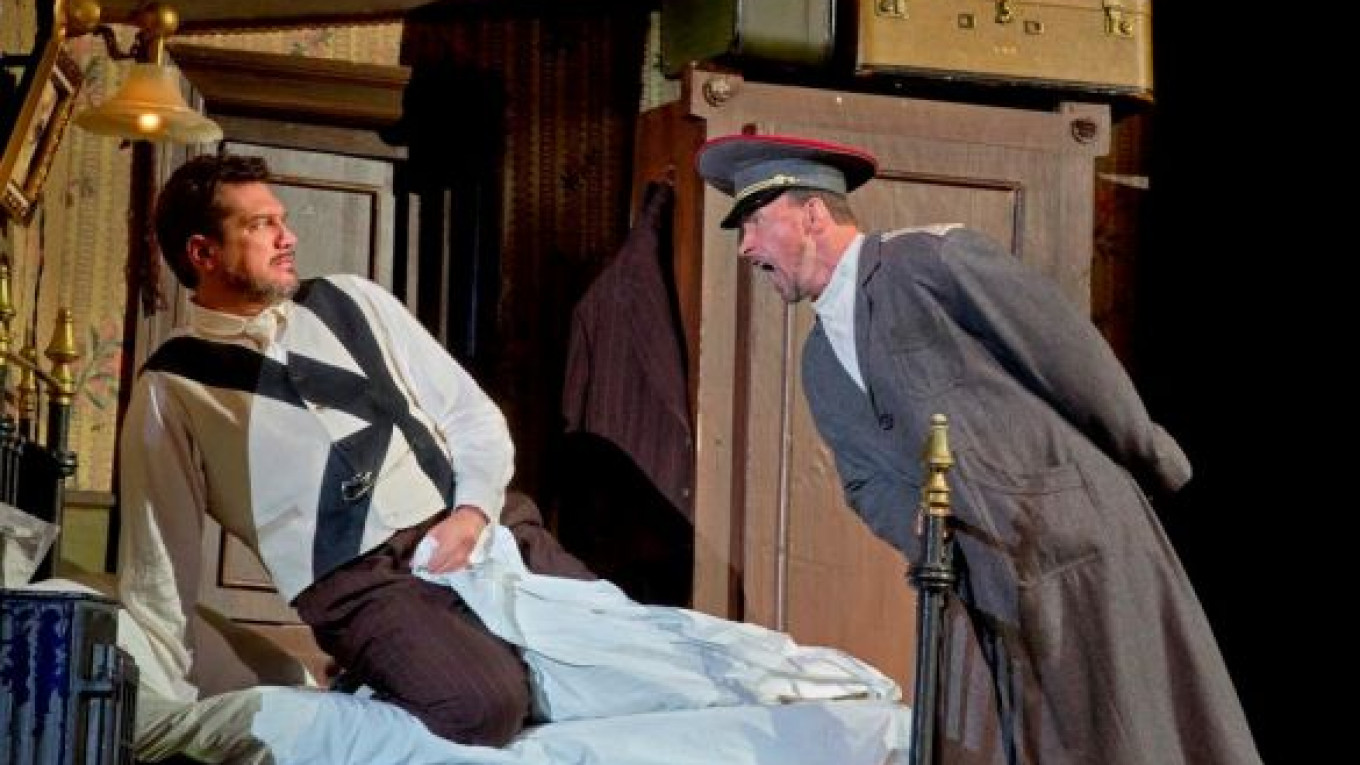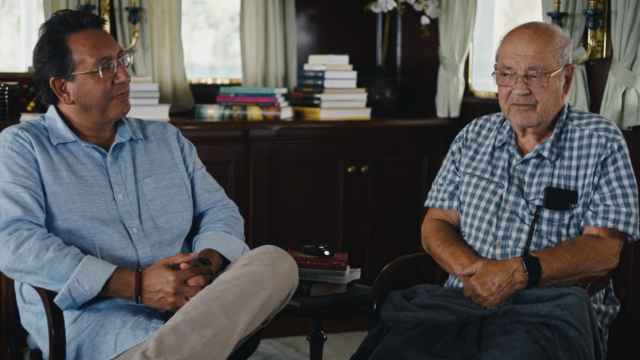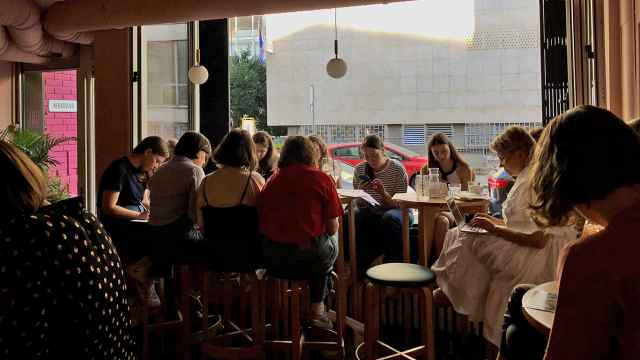2013 has been a good year for Russians in New York City. From stages to galleries, Russian-themed art and music are taking the city by storm.
The American opera and ballet world has always embraced Russian composers and performers, but this season looks set to break all previous records. With the immense number of productions featuring Russians on stages all over town, the only problem will be deciding which to attend.
Earlier this year, the Lincoln Center Theater premiered Richard Nelson's play "Nicolai and the Others." Set at the time of the historic collaboration between George Balanchine and Igor Stravinsky while they worked on "Orpheus," the play chronicles the creative process leading to what would be the inaugural production by the newly formed New York City Ballet, or NYCB.
At nearly the same time, the New York Philharmonic mounted "A Dancer's Dream." The multimedia spectacular reimagined the ballet music for Stravinsky's "The Fairy Kiss" and "Petrushka" with video projections, dance, puppetry, circus and theater to address ideas of inspiration and transformation and conjure a fantastical dream world that brought the composer's music to a whole new audience.
As if that were not enough, the American Ballet Theater in June premiered the complete "Triptych," a trio of one-act ballets set to the music of Shostakovich and choreographed by St. Petersburg's own Alexei Ratmansky with sets designed by George Tsypin. Tsypin was responsible for the Mariinsky's acclaimed 2003 production of Wagner's "Der Ring des Nibelunge" and has a long-standing relationship with both the theater and its artistic director, Valery Gergiev.
After the customary lull in activities during the summer holidays, Russian composers, choreographers, dancers and conductors are now back at work on what looks set to be another spectacular season for Russophiles.
The New York City Ballet, which is currently celebrating 50 years in a building designed for George Balanchine and the NYCB by the legendary architect Philip Johnson, honors its founding choreographer by staging 22 Balanchine works.
Widely regarded as one of the world's greatest venues for dance performances, the David H. Koch Theater, formerly the New York State Theater, will host an all-Balanchine program entitled "Black and White" on Oct. 4, which brings together "The Four Temperaments," "Episodes," "Duo Concertant," and "Symphony in Three Movements." All of the works dispense with decorative costumes and sets to focus attention on the dancer's movement and the music of Hindemith, von Webern and, of course, Stravinsky.
This is followed on Oct. 5, 9, 11 and 12 with another all-Balanchine program. Called "Short Stories" the evening features "La Sonnambula," "Prodigal Son," and "Slaughter on Tenth Avenue": three ballets with widely diverse narratives and evocative settings that include a strip club and a masked ball. The anniversary season will also feature a performance of Ratmansky's waggish "Namouna," set to a score by Edouard Lalo from 1882.
Meanwhile, across the plaza, three Russian operas will be staged at the Metropolitan Opera over the coming months with the participation of some of St. Petersburg's most celebrated talents.
This week, Anna Netrebko and Mariusz Kwiecien star in the Met premiere of Deborah Warner's "Eugene Onegin." Tchaikovsky's most popular opera opened the Met's 129th season last week with Valery Gergiev conducting, which he will also do on Oct. 5, 9 and 12. The Mariinsky's Pavel Smelkov will conduct the opera on Nov. 16 and 19.
The season premiere on Sept. 23 became a platform for protests against Russia's anti-gay legislation when demonstrators, both inside and outside the theater, lent an air of outrage to the black-tie affair. The protesters called for Gergiev and Netrebko, who both supported Vladimir Putin during the last Russian elections, to denounce the "war on Russian gays." Previously, an online petition urging the Met to dedicate the performance to gay rights in Russia succeeded in gathering some 9,000 signatures. The opera house's general manager Peter Gelb declined, saying in an opinion piece for Bloomberg News that it would be inappropriate to dedicate the opera's performances to political causes. The Met did, however, include the entire text of Gelb's supportive piece in the program on opening night.
Also this week, the Met is reviving artist William Kentridge's acclaimed production of Shostakovich's "The Nose," which premiered at the Met in 2010. Gergiev will once again conduct performances of the opera for the Met on Oct. 3, 8 and 12, before passing the baton to Smelkov for performances on Oct. 17, 22 and 26. Paulo Szot will reprise his celebrated performance of a bureaucrat whose satirical misadventures in search of his missing nose are based on Gogol's comic story set in St. Petersburg.
Rounding off the trio of Russian operas at the Met this season is a new production of Alexander Borodin's "Prince Igor," famous for its Polovtsian Dances, which premiered at the Mariinsky Theatre in 1890. The new version brings the opera to the Met for the first time in nearly 100 years and features Mariinsky soloists Ildar Abdrazakov and Mikhail Petrenko and will be conducted by Gianandrea Noseda.
A bit further south of the Lincoln Center, on West 57th street to be exact, Gergiev will take the stage of the illustrious Carnegie Hall on Oct. 10, 11 and 15. Celebrating the conductor's 60th birthday, the concerts focus on the music of three Russian composers — Stravinsky, Shostakovich and Rachmaninov — closely associated with Gergiev, who is also marking 25 years with the Mariinsky this year.
The Carnegie Hall series gets off to an electrifying start on Oct. 10 with an all-Stravinsky program featuring the complete score of "The Firebird," the 1911 version of "Petrushka" and "Rite of Spring." On the following evening, Gergiev conducts Shostakovich's "Concerto for Piano, Trumpet, and Strings, Op. 35," featuring pianist Denis Matsuev and Mariinsky trumpeter Timur Martynov, as well as the composer's "Symphony No. 8 in C Minor, Op. 65." On Oct. 15, the series comes to a close when Matsuev returns to perform Rachmaninov's "Piano Concerto No. 3 in D Minor, Op. 30," before Gergiev and the orchestra conclude with the composer's "Symphonic Dances, Op. 45."
If you can't make it to New York to see any of the performances, there is no reason to despair. All three of the Metropolitan Opera productions will be broadcast as part of the Met's Live in HD series of transmissions to cinemas around the world. Now in its 8th year and shown in Moscow at Formula Kino cinemas, 35MM and the GUM cinema hall, "Eugene Onegin" will be broadcast on Oct. 5 to launch the new season, while "The Nose" will be broadcast on Oct. 26. In March of next year, the Met's new production of "Prince Igor" will be screened.
On the visual arts scene, an exhibition currently on view at the Lombard-Fried Projects gallery by The Propeller Group that runs through Oct. 26 reinvigorates the once famous Leninist slogan, "Lived, Lives, Will Live!" Employing a "hyper-consumerist rebranding of the revolutionary leader's public image for the twenty-first century," the original portraits of Vladimir Lenin on view at the gallery once hung in regional Communist Party headquarters across the Soviet Union. Here they have been given hand-embroidered makeovers that add various hairstyles from Leonardo DiCaprio's filmography in reference to conspiracy theories about the actor being a lost relative of Lenin, while also addressing the political ramifications of representation and celebrity idolatry — something Russians are extremely familiar with.
Contact the author at artsreporter@imedia.ru
A Message from The Moscow Times:
Dear readers,
We are facing unprecedented challenges. Russia's Prosecutor General's Office has designated The Moscow Times as an "undesirable" organization, criminalizing our work and putting our staff at risk of prosecution. This follows our earlier unjust labeling as a "foreign agent."
These actions are direct attempts to silence independent journalism in Russia. The authorities claim our work "discredits the decisions of the Russian leadership." We see things differently: we strive to provide accurate, unbiased reporting on Russia.
We, the journalists of The Moscow Times, refuse to be silenced. But to continue our work, we need your help.
Your support, no matter how small, makes a world of difference. If you can, please support us monthly starting from just $2. It's quick to set up, and every contribution makes a significant impact.
By supporting The Moscow Times, you're defending open, independent journalism in the face of repression. Thank you for standing with us.
Remind me later.






